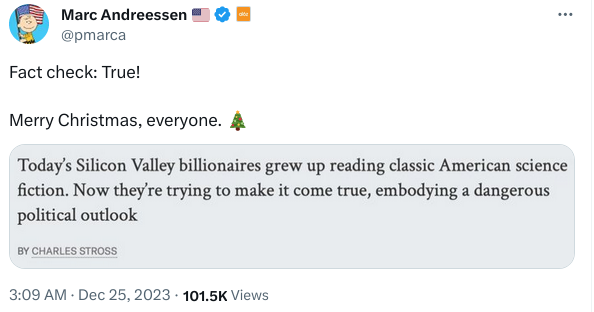British “science fiction author” Charles Stross takes to the pages of “science magazine” Scientific American to denounce “tech billionaires” to want to “make science fiction … real”.
Billionaires who grew up reading science-fiction classics published 30 to 50 years ago are affecting our life today in almost too many ways to list: Elon Musk wants to colonize Mars. Jeff Bezos prefers 1970s plans for giant orbital habitats. Peter Thiel is funding research into artificial intelligence, life extension and “seasteading.” Mark Zuckerberg has blown $10 billion trying to create the Metaverse from Neal Stephenson’s novel Snow Crash. And Marc Andreessen of the venture capital firm Andreessen Horowitz has published a “techno-optimist manifesto” promoting a bizarre accelerationist philosophy that calls for an unregulated, solely capitalist future of pure technological chaos.
These men collectively have more than half a trillion dollars to spend on their quest to realize inventions culled from the science fiction and fantasy stories that they read in their teens. But this is tremendously bad news because the past century’s science fiction and fantasy works widely come loaded with dangerous assumptions.
SF is a profoundly ideological genre—it’s about much more than new gadgets or inventions. Canadian science-fiction novelist and futurist Karl Schroeder has told me that “every technology comes with an implied political agenda.” And the tech plutocracy seems intent on imposing its agenda on our planet’s eight billion inhabitants.
⋮
Science fiction, therefore, does not develop in accordance with the scientific method. It develops by popular entertainers trying to attract a bigger audience by pandering to them. The audience today includes billionaires who read science fiction in their childhood and who appear unaware of the ideological underpinnings of their youthful entertainment: elitism, “scientific” racism, eugenics, fascism and a blithe belief today in technology as the solution to societal problems.
Scientific American (which has been owned by German publishers since 1986) has declared itself firmly in the decelerationist camp. I posted earlier here on 2023-10-17 about Marc Andreessen’s “techno-optimist manifesto” which Stross sees as “promoting a bizarre accelerationist philosophy”. Andreessen wrote “Our enemy is anti-merit, anti-ambition, anti-striving, anti-achievement, anti-greatness. … Our enemy is bureaucracy, vetocracy, gerontocracy, blind deference to tradition.” Our enemy is Charles Stross and Scientific American.
Update: (2023-12-25 13:30 UTC)
